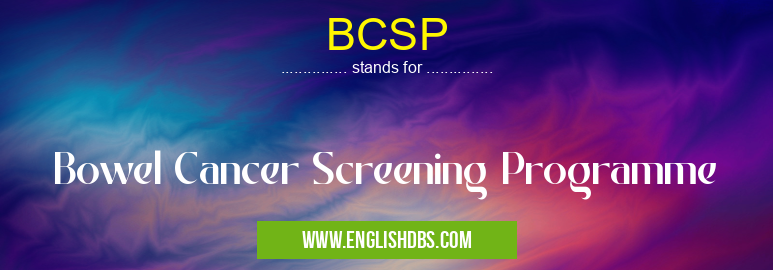What does BCSP mean in BRITISH MEDICINE
BCSP stands for Bowel Cancer Screening Programme. It is a government initiative and programme to ensure that all people in the UK are screened for bowel cancer in order to detect any early signs of the disease. The programme provides various free opportunities for people aged between 60-74 to get tested, as well as other age groups depending on risk factors or family history. The aim of BCSP is to reduce the number of deaths from bowel cancer by diagnosing it earlier.

BCSP meaning in British Medicine in Medical
BCSP mostly used in an acronym British Medicine in Category Medical that means Bowel Cancer Screening Programme
Shorthand: BCSP,
Full Form: Bowel Cancer Screening Programme
For more information of "Bowel Cancer Screening Programme", see the section below.
What Is BCSP? BCSP stands for Bowel Cancer Screening Programme and is a national initiative set up by the UK Government which aims to reduce deaths from bowel cancer by improving early detection and diagnosis rates. The programme offers two types of tests
faecal occult blood test (FOBT) where a stool sample is taken by post; and colonoscopy where an endoscope is used to look directly inside your large intestine and rectum. Both tests are free on the NHS for those within eligible age groups or with certain risk factors or family history. Early detection through BCSP can increase survival rates significantly if treatment begins before symptoms become severe.
Essential Questions and Answers on Bowel Cancer Screening Programme in "MEDICAL»BRITMEDICAL"
What is the Bowel Cancer Screening Programme?
The Bowel Cancer Screening Programme is a programme spearheaded by the National Health Service (NHS) in England with the goal of reducing the number of people who die from bowel cancer through early detection and treatment. Through this programme, individuals over the age of 60 are offered a stool sample test every two years to screen for the disease.
When should I begin screening for bowel cancer?
You should begin screening for bowel cancer at age 60, as this is when you become eligible for the Bowel Cancer Screening Programme. However, if you have any family history of bowel cancer or other risk factors, your doctor may recommend that you start screening earlier.
How do I participate in the Bowel Cancer Screening Programme?
If you are aged 60 or over and registered with a GP in England, then you will automatically receive an invitation to take part in the programme every two years. The letter will include instructions on how to collect your sample and submit it for testing.
Is there any cost involved with participating in the Bowel Cancer Screening Programme?
No, participation in the Bowel Cancer Screening Programme is free of charge.
What if I do not receive an invitation letter for my screening test?
If you are eligible to participate in the programme but do not receive an invitation letter within 12 weeks of your eligibility date, contact your local NHS Trust or GP surgery to request one. You can also contact NHS England directly on 0800 169 2819 (free from UK landlines).
How long does it take to receive results from a bowel cancer screening test?
After submitting your sample, results are usually available within 2-4 weeks depending on when it was received and whether further testing is needed. You will be informed of your result either directly by mail or via your GP surgery.
What if my screenings results show abnormalities?
If your screening results suggest that something abnormal may be present, then further tests may be recommended which could include an endoscopy or colonoscopy procedure. Your doctor will provide more information about these procedures if necessary.
Final Words:
BCSP stands for Bowel Cancer Screening Programme and is a vital programme designed to help combat the high rate of deaths from bowel cancer in the UK each year. Through offering free FOBT and colonoscopy tests on the NHS, more cases can be detected early which increases chances of successful treatment while reducing mortality rates from this dreaded disease. Anyone aged between 60-74 should take advantage of this opportunity or those with certain risk factors or family history should speak with their doctor about being tested outside of this eligibility criteria.
